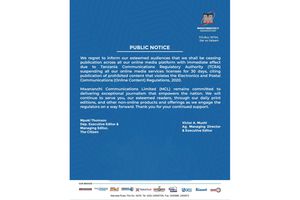EABC keen on green packaging technologies

What you need to know:
- The Nairobi conference in which EABC officials participated esolved to establish an engagement framework as well as advocate for standardisation and harmonisation of measures and procedures for circular packaging
Arusha. The East African Business Council (EABC) is keen on green packaging technologies that would safeguard the environment.
Frank Dafa, a technical expert with the regional business body, said packaging using environmentally friendly materials should be promoted.
"Businesses should aim to meet sustainable packaging requirements to reduce costs and boost their performances," he pointed out.
Mr Dafa made the appeal during a recently held conference on circular packaging organised in Nairobi for stakeholders from the region.
He outlined crucial challenges related to circular packaging, emphasising that the time has come for companies to invest there for environmental benefits.
He urged stakeholders to establish a regional framework for the development of a circular economy and sustainable waste management.
Circular economy, or CE, is a model of production and consumption that involves reusing and recycling existing materials and products.
CE largely aims to tackle global challenges such as pollution, waste, biodiversity loss and climate change through a transformation to green technologies.
The model has gained popularity not only for regenerating natural systems but also because it helps to minimise emissions and consumption of raw materials.
Circular packaging, on the other hand, is the design of packaging intended to promote reuse and recycling instead of dumping.
This type of packaging is often seen as a more sustainable alternative to traditional packaging made from virgin materials only meant for disposal.
Circular packaging can be made from various materials, including paper, cardboard, glass, metal and even some plastic.
The Circular Packaging Conference in Nairobi was organised in partnership with the Kenya Extended Producers Organisation (Kepro).
Other partners included the Confederation of Danish Industries (DI) and two other bodies identified only as DOW and Silafrica.
Also in attendance were exhibitors, essential actors in waste management and the circular economy along the value chain, manufacturers, and business membership organisations.
The conference resolved to establish an engagement framework as well as advocate for standardisation and harmonisation of measures and procedures for circular packaging.
It has emerged that the East African Community (EAC) bloc has huge potential in solid waste for a circular economy.
Yet the bloc has yet to tap into the full potential of the thousands of tonnes of waste generated each day.
Thousands of tonnes of waste are generated each day, 14,800 of them in Tanzania alone, 48 percent of which is plastic.
The region not only ranks low in waste management but also in turning waste into different products through recycling, reuse and job creation.
Private sector investment in waste management is reportedly still low, as are the laws on the safe disposal of hazardous electronic and plastic waste.
By investing in waste management and a circular economy, firms will not only enhance their reputation by discarding hazardous waste.
They are likely to increase company sales and profitability through the production of green products, which are currently in higher demand globally.




